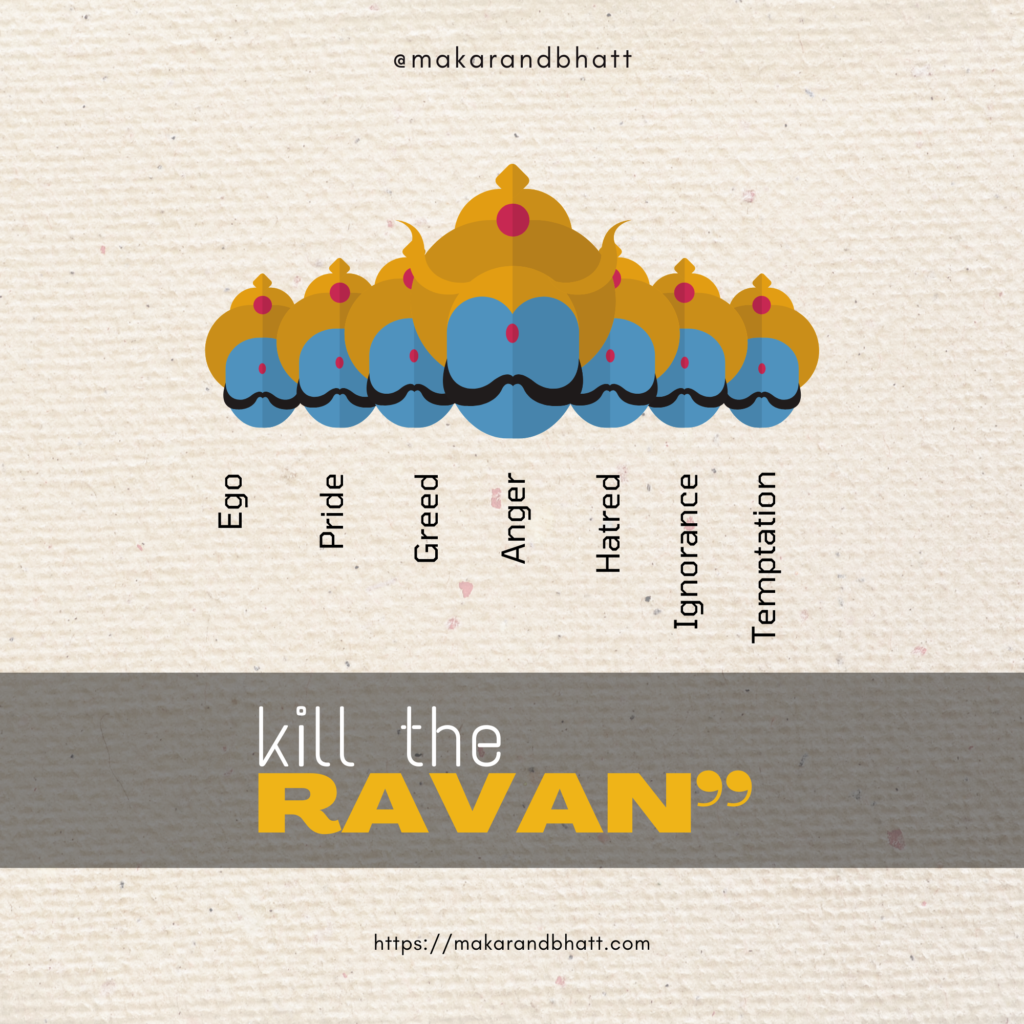Lankesh – Ravana, the ten-headed demon king from the Indian epic Ramayana, is not just a mythological character but a metaphor for the multifaceted vices within each one of us. His ten heads symbolize not just power, knowledge, and ambition but also the harmful traits of ego, pride, anger, attachment, greed, lust, envy, and ignorance—qualities that can take over our personality and impact our relationships, especially with our children.

Parenting in today’s world is more complex than ever before. Each day, we face challenges that test our patience, emotions, and values. Sometimes, the “Ravan” within us—our egos and unresolved frustrations—manifests, making us harsh, overbearing, or indifferent parents. Being a good parent isn’t about eliminating every fault or emotion, but about recognizing these heads of Ravan within us and striving to conquer them.
This will help you explores how you can kill the Ravan within yourself to become the right parent—one who raises confident, resilient, and happy children.
Understanding the Ten Heads of Ravan
Let’s break down these ten heads and understand how they impact our behavior as parents:
-
- Ego: When a parent’s ego dominates, it creates a rift between them and their child. This ego manifests as an insistence on authority and refusal to acknowledge a child’s perspective. For instance, consider a father who refuses to listen to his teenage daughter’s opinion about her career. His ego prevents a healthy dialogue, leading to resentment and disengagement.
- Pride: Parental pride often leads to unrealistic expectations. A parent proud of their academic or professional achievements may push their child to follow the same path, ignoring the child’s talents and desires. Such pride leads to undue pressure and robs the child of their unique identity.
- Anger: Uncontrolled anger is the quickest way to damage a parent-child relationship. It might make children fear their parents, but it does not inspire respect or trust. Parents who regularly lose their temper in the name of discipline end up creating a communication barrier.
- Attachment: Excessive attachment is another form of subtle dominance. Overprotective parents, who are unwilling to let their children experience failure, can stunt their growth. A mother who does her 12-year-old son’s school project out of love is actually depriving him of the opportunity to learn problem-solving skills.
- Greed: The greed to fulfil personal ambitions through one’s children is destructive. Many parents want their children to achieve things they could not in their own lives, be it in academics, sports, or careers. This greed compels parents to live vicariously through their children, burdening them with heavy expectations.
- Lust: In the context of parenting, lust can mean the obsessive desire for recognition through the child’s achievements. Parents caught in this trap are constantly comparing their child’s performance with others, pushing them to participate in a rat race that ultimately affects their well-being.
- Envy: When parents start comparing their child’s success or behavior with others, envy creeps in. Comments like, “Why can’t you be as disciplined as your cousin?” or “Your friend scored better than you in math” undermine a child’s self-esteem and create a toxic atmosphere.
- Ignorance: Being ignorant of the child’s emotional and psychological needs can lead to misunderstandings and conflicts. For instance, dismissing a child’s anxiety about exams as laziness or inattentiveness shows ignorance about their true struggles.
- Hatred: Parental hatred can take the form of conditional love. If a child fails to meet the parent’s expectations, they might be subjected to cold behavior or lack of affection. This hatred alienates the child and instills a sense of worthlessness.
- Fear: When parents are driven by fear—fear of their child failing, fear of societal judgment, or fear of the future—they impose restrictions and limitations on the child. They project their anxieties onto the child, preventing them from exploring the world with courage.
Slaying the Ten-Headed Ravan Within: Strategies for Right Parenting
Killing the Ravan within is not a one-time act but an ongoing process of self-awareness and transformation. Here’s how you can recognize and conquer these negative traits to become a nurturing parent:
1. Be Conscious of Your Ego
Recognize when your ego is coming in the way of communication with your child. The need to assert authority often leads to arguments that accomplish nothing. Instead, strive for open discussions where your child feels heard. When you disagree with your child’s decisions, remember to phrase your opinions as guidance rather than commands.
Example: If your child wants to choose a career that you think is unstable, like music or arts, instead of dismissing their idea, engage in a conversation. Discuss their interest and try to understand their perspective. Show that you trust their judgment while sharing your own concerns.
2. Balance Pride with Realistic Expectations
Take pride in your child’s achievements without setting them up on a pedestal. Appreciate them for their efforts rather than for results. This nurtures a growth mindset and helps them focus on the learning process rather than the fear of failing.
Example: When your child scores well in exams, say, “I’m proud of how hard you worked,” rather than “You topped the class—everyone should see your talent!” This subtle difference shifts the focus from competition to personal growth.
3. Replace Anger with Patience
Anger is a sign of frustration and loss of control. Practice mindfulness techniques like deep breathing or counting backward when you feel the urge to lash out. Instead of reacting immediately, take a pause, and approach the situation with a calm mind.
Example: When your child breaks something at home, instead of shouting, try to understand why it happened. Was it carelessness or an accident? Help them clean up the mess, making it a learning moment on responsibility.
4. Practice Detached Attachment
Letting go of excessive attachment doesn’t mean being indifferent. It means allowing your child to experience life while being a guiding presence. Encourage them to take small risks, face challenges, and learn from failures.
Example: When your child faces rejection in a competition or exam, resist the urge to intervene. Instead, discuss what they can learn from the experience and how they can improve. This strengthens their resilience.
5. Channel Greed into Encouragement
Transform the greed for your child’s success into a healthy form of encouragement. Support their interests and passions rather than imposing your unfulfilled dreams.
Example: If you wanted to become a doctor but couldn’t, don’t push your child into the same profession. Encourage them to explore various fields, and let their passion guide them.
6. Substitute Lust for Achievement with Love for Learning
Focus on nurturing a love for learning in your child instead of pushing them towards trophies and certificates. Encourage curiosity, creativity, and independent thinking.
Example: Instead of enrolling your child in every competition to gain accolades, ask them what they genuinely enjoy. Let their interests lead the way, and provide the resources and support they need.
7. Manage Envy through Gratitude
Combat envy by appreciating your child for who they are rather than what they achieve. Celebrate small victories and practice gratitude for their unique qualities.
Example: If your child struggles in sports but excels in arts, praise their creativity rather than lamenting their lack of athletic skills. This will help them embrace their strengths.
8. Replace Ignorance with Understanding
Make an effort to understand your child’s world. Educate yourself about the challenges they face in school, peer pressures, and the impact of social media. This will bridge the generational gap and foster empathy.
Example: If your child spends excessive time on social media, instead of labeling it as a waste, explore the platforms they use. Understand their motivation and set boundaries together, rather than imposing rules unilaterally.
9. Counter Hatred with Unconditional Love
Unconditional love means supporting your child irrespective of their performance. When you let your love hinge on achievements, it can create a void in the child’s heart. Instead, show them that they are valued for who they are.
Example: If your child scores poorly in exams, show concern for their mental state rather than anger for the marks. Say, “I love you, and I’m here to help you improve. Let’s work on this together.”
10. Transform Fear into Trust
Replace your fear with trust in your child’s abilities. While it’s natural to be protective, excessive fear can restrict their growth. Allow them to make mistakes and learn, knowing that you are there to support them.
Example: If your child wants to go on a solo trip or try an unconventional sport, don’t project your fear of accidents or failure onto them. Educate them about the risks and trust them to make wise decisions.
Becoming a “Ram” to Your Children’s “Ravan”
In the Ramayana, Lord Ram defeats Ravan not by overpowering him with brute force but by using wisdom, restraint, and righteousness. As a parent, you can mirror these qualities by being patient, empathetic, and steadfast in your values.
-
- Be a role model: Children learn more from observation than instruction. Exhibit the behavior you want your child to emulate. Show humility, patience, and integrity in your actions.
-
- Encourage dialogue: Create a safe space for your child to express their emotions, frustrations, and aspirations. This open communication will help dismantle any Ravan-like tendencies in both of you.
-
- Practice self-reflection: Regularly introspect to identify the heads of the Ravan that still remain within you. Acknowledge your flaws without self-judgment and work on them consistently. By cultivating self-awareness, you’ll become a better parent and individual.
Turning Ramayana’s Teachings into Practical Parenting Strategies
The epic Ramayana teaches us that even the mightiest and most knowledgeable can be destroyed by their evils. When we bring these teachings into our parenting approach, we can effectively raise emotionally healthy and balanced children. Here’s how you can turn these profound lessons into practical strategies:
1. Practice Self-Awareness:
Ravan’s downfall was his inability to see the evil within himself. As a parent, practicing self-awareness helps you recognize when your vices are influencing your actions. You may want to start keeping a journal to reflect on your daily interactions with your child. Ask yourself:
-
- Was I too harsh today?
- Did I listen to my child’s concerns?
- Did I project my own frustrations onto them?
Being mindful of these interactions helps you identify the heads of Ravan that are still active and enables you to take corrective action.
Example: If you notice that you frequently yell at your child over minor issues, take a step back and ask yourself why. Is it really about your child’s behavior, or is there a deeper issue, like stress from work, that’s triggering your anger?
2. Cultivate Patience and Empathy:
Ravan was known for his impatience and explosive temper, which ultimately led to his destiny. As a parent, you can overcome this trait by cultivating patience. Whenever your child’s behavior frustrates you, pause and take a few deep breaths. Try to see the situation from their perspective.
Example: If your child is throwing a tantrum, instead of reacting with anger, calmly ask them what’s bothering them. Sit down at their level, make eye contact, and reassure them that you’re there to listen. This approach helps them feel understood and reduces their emotional outburst.
3. Be a Leader, Not a Dictator:
Ravan’s dictatorial rule stemmed from his desire to control everything around him. As a parent, you may sometimes fall into a similar trap—trying to dictate every aspect of your child’s life. Instead, aim to be a leader who guides with wisdom and compassion.
Example: Instead of dictating what extracurricular activities your child should pursue, offer them options and let them choose. This empowers them to make decisions and feel more confident in their choices.
4. Encourage Accountability, Not Blame:
Ravan constantly blamed others for his misfortunes, never taking accountability for his actions. In contrast, encourage your child to own up to their mistakes. When they make a mistake, guide them to understand the consequences of their actions without resorting to blame or punishment.
Example: If your child didn’t complete their homework on time, instead of saying, “You’re so irresponsible,” ask, “What can we do to ensure this doesn’t happen again?” Help them brainstorm solutions, like creating a timetable or setting reminders.
5. Teach the Value of Humility:
Ravan’s immense pride in his intelligence and power blinded him to his weaknesses. Teaching your child the value of humility will prepare them to face life’s ups and downs with grace. Share stories of your own failures and what you learned from them. Encourage your child to stay grounded, regardless of success or failure.
Example: If your child wins a competition, praise their efforts, but also remind them to appreciate their competitors. If they lose, acknowledge their feelings and help them see what they can learn from the experience.
6. Nurture Self-Expression Without Judgment:
Ravan silenced dissenting voices, believing only his opinion mattered. In a similar way, if parents dismiss their child’s feelings or thoughts, they unknowingly teach them to suppress their emotions. Make it a point to nurture an environment where your child feels safe to express themselves without fear of judgment or ridicule.
Example: If your teenage child shares their thoughts on a controversial topic, listen without interrupting. Avoid dismissing their views as “childish” or “immature.” Engage in a respectful conversation, where you share your perspective without invalidating theirs.
7. Promote a Healthy Relationship with Failure:
Ravan’s attachment to victory and dominance made him unable to accept defeat, even when it was inevitable. In parenting, a fear of failure can translate into overprotectiveness or micromanagement. Teach your child that failure is not a sign of inadequacy but an opportunity for growth.
Example: If your child fails to secure a spot on a sports team, encourage them to practice more if it’s something they love, or explore other interests if they feel this one isn’t for them. Let them know it’s okay to redirect their energies and try new things.
8. Replace Punishment with Consequence-Based Discipline:
Ravan’s form of punishment was brutal and unyielding, fostering only fear and resentment. Effective parenting requires understanding the difference between punishment and consequences. While punishment is punitive and often leads to rebellion, consequences are a natural result of one’s actions, promoting responsibility.
Example: If your child neglects their chores, a punishment would be grounding them for a week. A consequence, on the other hand, would be letting them experience the inconvenience of not having clean clothes or a tidy room. This natural result helps them understand the importance of their responsibilities.
9. Encourage Self-Reflection and Forgiveness:
Ravan’s inability to reflect on his actions and seek forgiveness led to his tragic end. Teach your child to reflect on their behaviour and forgive themselves for mistakes. Help them see that growth comes from self-compassion, not self-punishment.
Example: If your child speaks rudely to a friend and later regrets it, encourage them to apologize and make amends. Guide them to reflect on why they acted out and how they can handle such situations better in the future.
10. Instil a Sense of Purpose:
Ravan was driven by lust for power and revenge, which ultimately clouded his sense of purpose. Help your child develop a sense of purpose that’s rooted in values like kindness, integrity, and empathy. Encourage them to set personal goals that align with these values.
Example: When discussing career aspirations or life goals, ask your child, “How do you want to contribute to the world?” This question shifts the focus from material success to making a meaningful impact.
A New Age Parenting Model: Embracing the Sita-Ram Philosophy
While we talk about slaying the Ravan within us, we should also imbibe the qualities of Sita and Ram—compassion, wisdom, and steadfastness. Just as Lord Ram was a symbol of patience and righteousness, be a moral compass for your child. Just as Sita personified resilience and self-respect, teach your child to stand up for their beliefs with grace and dignity.
Creating this balanced approach ensures that while you are firm, you are not authoritarian; while you are loving, you are not overindulgent; and while you are guiding, you are not controlling. This dynamic way of parenting equips your child with the inner strength to face any challenges life throws at them.
The Eternal Quest to Slay the Ravan Within
Parenting is as much about growing yourself as it is about nurturing your child. Each day presents opportunities to slay the heads of Ravan within us and evolve into a more conscious and compassionate parent. By recognizing and confronting your own vices, you set an example for your child on how to deal with their own challenges and shortcomings.
The goal is not perfection but progress. With every effort to conquer anger with patience, ego with humility, and fear with trust, you inch closer to being the kind of parent who guides their child not with the force of authority but with the light of wisdom. Slay the Ravan within, and let the Ram in you rise to inspire, support, and nurture your child into a balanced and self-aware individual. After all, the true victory is not in defeating an external enemy but in conquering oneself.
Embrace this journey with courage and love, and watch as you and your child grow together, free from the shadows of the Ravan within.
– Makarand Bhatt
The writer of this blog is an experienced International Education & Career Advisor, helping parents to plan and manage the global education of their children.
You can share your feedback/reviews or connect with him at makarand.bhatt@yahoo.com or +91 99676 38666.










